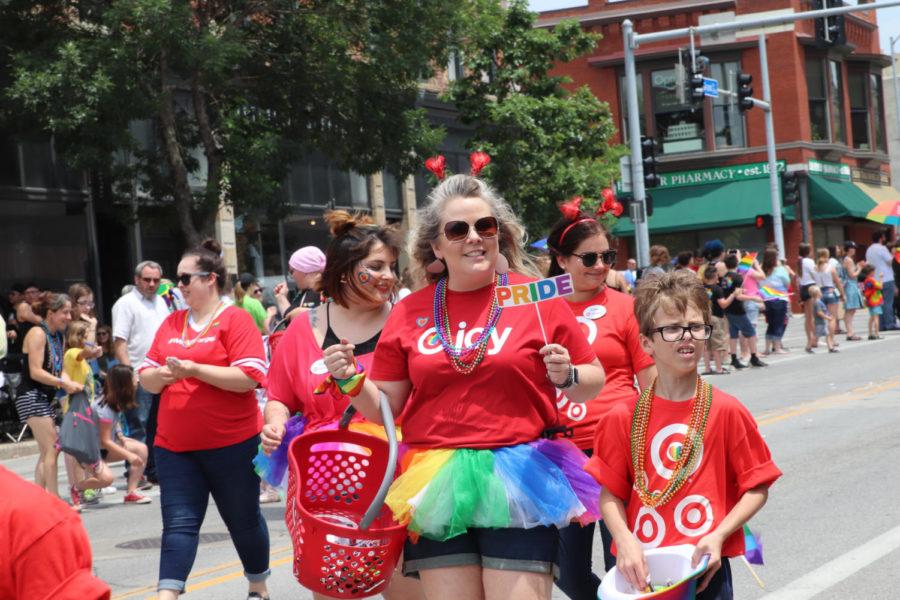Gibbons: Think critically when buying pride merchandise
Representatives from Target walk in the Des Monies Pride Parade on June 9. The parade started at the Iowa Capitol Building and traveled down Grand Avenue in the East Village.
June 27, 2019
In marketing, rainbow is the new black when June rolls around. This year marks the 50-year anniversary of the Stonewall Riots in New York City, led by Marsha P. Johnson, a black, transgender woman.
Pride has become increasingly commodified since its inception. With more brands selling pride merchandise than ever, it can get tricky trying to sift out which brands are truly allies from who’s just trying to make a quick, pandering buck.
Mass-produced clothing is the most accessible to many people and offers an attractive opportunity to partake in pride festivities without spending much money. However, it is important that you think critically when shopping for your pride gear.
Mass production of apparel as a means of keeping the price of production down has its own costs. The apparel manufacturing industry has a long history of exploiting workers through long hours, low wages and terrible working conditions. This exploitation leaves queer workers in even more danger of abuse.
After a workers’ strike in 2015, the Worker Rights Consortium began an investigation into the conditions at Hansae Vietnam, a large factory just outside of Ho Chi Minh City. The factory has produced garments for major companies such as Nike, Gap, H&M, L Brands (owner of Victoria Secret), Hanes, Inditex (owner of Zara), JCPenney, Macy’s, Children’s Place, Target and Walmart. Almost all of these companies have pride merchandise or campaigns this year.
Their report, published in 2016, depicted a grim scene full of labor rights violations. There was extensive wage theft with forced — and often excessive — overtime, dangerously high temperatures in factory buildings which caused many workers to collapse on the job, exposure to toxic chemicals and verbal and physical abuse.
Ethical consumption can be difficult in this day and age with ever-increasing inflation limiting what’s affordable. That’s where the internet comes in. LGBTQIA+ blog Autostraddle has compiled a long list of 32 LGBTQIA+ owned stores that are great alternatives to corporations.
Many of these stores are Etsy stores, such as XYST Ugli, Demian Diné Yazhi’ and Bianca Designs. XYST Ugli’s owner is a queer artist themselves, and produces apparel and art prints on various topics such as ableism, sex work and queerness. Demian Diné Yazhi’ is owned by the founder of R.I.S.E. (Radical Indigenous Survivance & Empowerment) and sells many products bearing intersectional slogans from an indigenous lens. Bianca Designs sells inclusive pins and gifts. Many of the Etsy shops on Autostraddle’s list prioritize donations and sustainability, and sell their merchandise year-round, instead of pitching it all into landfills after pride month is over.
No matter how you choose to purchase your pride gear, remember that your business is influential. In the Washington Post’s most recent LGBTQ Community Survey, 76% of respondents said that they will shop more from companies that support the LGBTQIA+ community. Businesses wouldn’t try to earn your business with these campaigns if they didn’t understand how influential the LGBTQIA+ community is. The power is in your hands to decide who you support, and the first step to doing so is to think about where the product you’re buying comes from.







